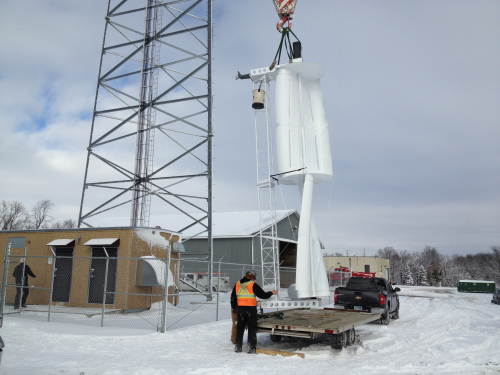
These turbines are being installed on communications towers in the US, offering the telecommunications companies a greener way to power their equipment.
This application won the Composites Sustainability Award, in the American Composites Manufacturers Association (ACMA)’s Awards for Composites Excellence (ACE) competition. The award was presented during the ACMA’s Composites 2013 trade show in Orlando, Florida, in January.
The entire Windstrip rotor assembly is 224 inches in height. It’s comprised of two sections each containing four vertical wing blades. Each blade is 52 inches long by 32 inches wide. The end caps have a diameter of 63 inches. The entire turbine must be less than 20 ft in height so it will fit in a 20 ft rental section on the towers
| The thermoformed ABS plastic sheet is an integral part of the structure of the part. It serves as the mould for forming the fibreglass layer and is permanently bonded to it using our patented TEC process. It adds stiffness to the parts but still retains the flexibility required to handle this rigorous application. |
| Kent Shepherd, Director of Sales & Marketing, Plastics Unlimited Inc |
The turbine parts are moulded using Plastics Unlimited’s patented Tooless Engineered Composite (TEC®) process which results in a tough, durable thermoformed ABS (acrylonitrile butadiene styrene) thermoplastic outer shell bonded to an inner layer of glass reinforced polyester. These layers are permanently bonded using a vacuum bag infusion. This process is reported to allows control of the critical degree of twist for the helical blades and ensures the proper thickness and pitch for the leading and trailing edges of the blades.
The resin supplier is CCP Composites; the fibre reinforcement, Chomarat Rovicore, is supplied by Composites One. The ABS is supplied by Spartech Plastics.
The flexibility and strength provided by the ABS and fibreglass is critical for handling the dynamic operation of the wind turbine, Plastics Unlimited reports. The ABS resists the cracking that can occur with gel-coat in harsh operating conditions. The light weight of the rotor component is critical since these turbines need to be lifted into place and mounted on the sides of communication towers.
Plastics Unlimited is located in Preston, Iowa, USA. Its TEC process incorporates the benefits of a thermoformed product and the strength of fibreglass reinforcement. This closed mould tool-less process utilises the thermoformed shell as the tool surface. The result is an extremely durable product with high finish quality. The TEC process produces little or no VOCs.




